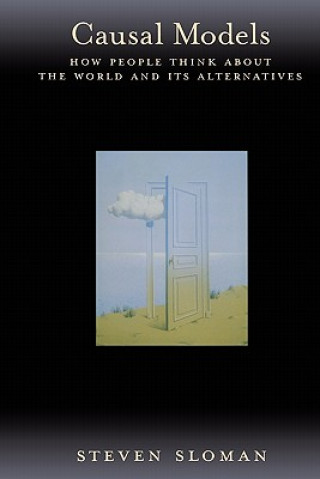
Livrare
Consilier de cumpărături





Nu se pretează? Nu contează! La noi puteți returna bunurile în 30 de zile
 Voucher cadou
orice valoare
Voucher cadou
orice valoare
Cu un voucher cadou nu veți da greș. În schimbul voucherului, destinatarul își poate alege orice din oferta noastră.
Casual Models
 engleză
engleză
 110 b
110 b
30 de zile pentru retur bunuri
Ar putea de asemenea, să te intereseze


Human beings are active agents who can think. To understand how thought serves action requires understanding how people conceive of the relation between cause and effect, between action and outcome. In cognitive terms, how do people construct and reason with the causal models we use to represent our world? A revolution is occurring in how statisticians, philosophers, and computer scientists answer this question. Those fields have ushered in new insights about causal models by thinking about how to represent causal structure mathematically, in a framework that uses graphs and probability theory to develop what are called causal Bayesian networks. The framework starts with the idea that the purpose of causal structure is to understand and predict the effects of intervention. How does intervening on one thing affect other things? This is not a question merely about probability (or logic), but about action. The framework offers a new understanding of mind: Thought is about the effects of intervention and cognition is thus intimately tied to actions that take place either in the actual physical world or in imagination, in counterfactual worlds. The book offers a conceptual introduction to the key mathematical ideas, presenting them in a non-technical way, focusing on the intuitions rather than the theorems. It tries to show why the ideas are important to understanding how people explain things and why thinking not only about the world as it is but the world as it could be is so central to human action. The book reviews the role of causality, causal models, and intervention in the basic human cognitive functions: decision making, reasoning, judgment, categorization, inductive inference, language, and learning. In short, the book offers a discussion about how people think, talk, learn, and explain things in causal terms, in terms of action and manipulation. "Sloman has written an accessible, popular-level book that will serve as a useful general introduction to the tricky and complex issues involved in understanding causality and its role in cognitive processing. For people who are unfamiliar with the issues and the research involved, this is a good starting point, although parts may require thoughtful rereadings. For people who are generally familiar with the issues but not the recent research or theoretical conceptions (e.g. , the use of counterfactuals), this book can serve as a useful guide to update one's knowledge. People who are actively working in this area will probably find this book a quick and enjoyable read."--Michael Palij, PsycCRITIQUES "The field of Bayesian causal models is becoming increasingly important for theory building in cognitive science. This book provides a lively and lucid introduction to the core concepts, and weaves them together with the latest research on causality and related topics from the cognitive sciences. Elegant and entertaining."--Nick Chater, Director of the Institute for Applied Cognitive Science and Professor of Psychology, University of Warwick "The scientific analysis of causal systems has become much more sophisticated with recent developments in computer science, statistics, and philosophy during the past decade. For the first time, we have available a comprehensive formal language in which to represent complex causal systems and which can be used to define normative solutions to causal inference and judgment problems. Steven Sloman's book makes these important developments easily accessible to the reader, as well as presenting many of his own exciting applications of these new ideas in behavioral studies of learning and judging causal relationships. This well-written book is full of profound insights and fascinating results. Anyone who wants to know what's going on at the cutting edge of cognitive science should read it." --Reid Hastie, Professor of Behavioral Science, University of Chicago "In the last 15 years, there has been a quiet revolution in how we model, understand, and learn about the causal structure of the world. Having started in philosophy and computer science, but now vital in psychology and statistics, the causal revolution has been slowed by the conspicuous absence of a truly readable book-length introduction. Fortunately, Steve Sloman has now written one. In a book that includes all the key ideas behind causal modeling but none of the tedious technical details, hundreds of worked examples ranging from marketing to arithmetic, and dozens of applications ranging from how we categorize the world to how we might be evolved to learn about its causal structure, Sloman has made a difficult subject exciting and simple." --Richard Scheines, Professor of Philosophy, Carnegie Mellon University "Steven Sloman's Causal Models is the first broadly accessible book to survey an important and growing field of cognitive research: how people understand the causal structure of their world, and the role of causal understanding in all aspects of thinking, perceiving, and acting. No difficult technical concepts are assumed. Important unifying themes are explained clearly and illustrated with numerous examples. It will provide an excellent entry into this field for students, researchers, or interested general readers." --Joshua B. Tenenbaum, Paul E. Newton Career Development Professor, Department of Brain and Cognitive Sciences, Massachusetts Institute of Technology
Informații despre carte
 engleză
engleză




 Cum să cumpăr
Cum să cumpăr























